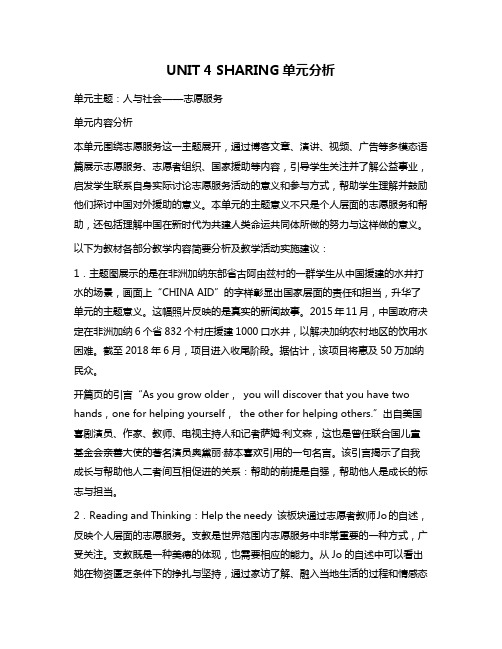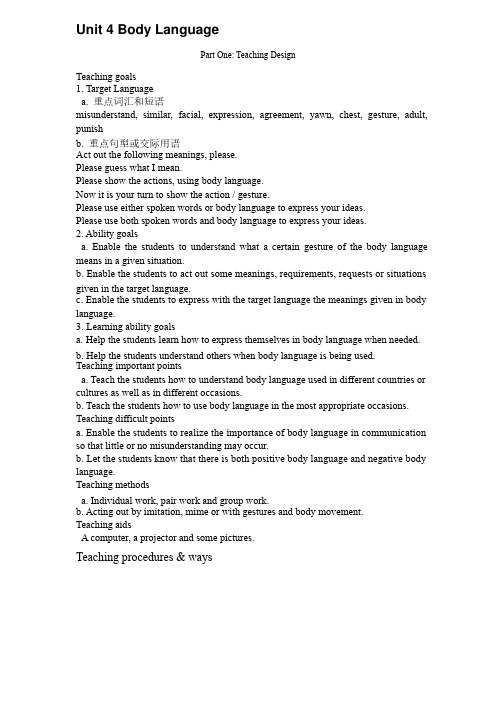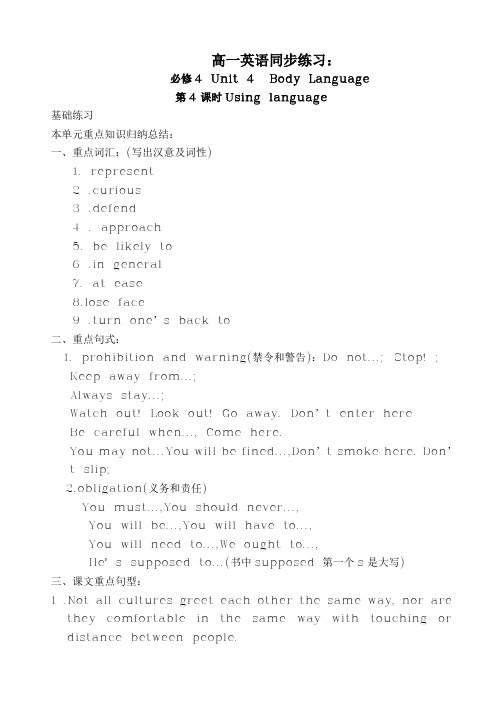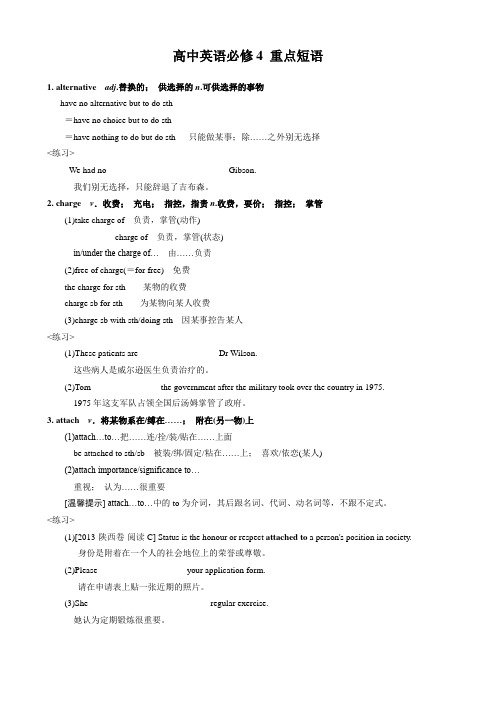高中英语必修四第四单元重点
高中英语选择性必修第四册Unit4 Section Ⅰ Understanding ideas讲义

核心单词forehead ,blank,dizzy,chairwoman,potential,enterprising,input,phase,purchase,distribution,bonus,guidance,consultant,conventional,discriminate,equator,estate,superior,mild,calorie,subjective,financial,automatically,sorrow,hire,expense,abuse,theft,purse重点短语as to,take a deep breath,be fond of,end up,in the hope of,a world away from,be bitten by the ... bug,row upon row,start out,go into debt,rent out,make ends meet,be relevant to,take on,do a further favour,at the expense of,response to,at rock-bottom prices,be subject to重点句型1.独立主格结构作状语 2.That is why ...“那/这就是为什么……” 3.whether... or...引导的让步状语从句单元语法复习定语从句主题写作写一篇关于非现金支付的文章Section ⅠUnderstanding ideas1.run down her ________ 顺着她的额头往下流2.their ________ faces 他们木然的表情3.feeling ________ 感到眩晕4.________ of her own company 她自己公司的董事长5.realise their full ________ 充分发挥他们的潜力6.the all-important ________非常重要的投入7.the initial _________ 初始阶段8.________ cosmetics 购买化妆品9.a decent _________ 一笔可观的奖金10.an expert ________ 一位专家顾问1.enterprise n.事业心;进取心;创业精神→________ adj.有创业精神的;有事业心的;有进取心的2.distribute v.分发;分配;分销→________ n.(商品的)分销,经销3.guide n.指南;向导;指导者v.指引;指导→________ n.指导,引导1.____________ 至于,关于,就……而论2.____________ 深呼吸3.____________ 喜爱,爱好4.____________ 最终,结果是5.____________ 怀着……的希望6.____________ 与……大不相同7._____________ 对……产生浓厚的兴趣8.____________ 鳞次栉比9.____________ 开始1.[句型公式]独立主格结构作状语They stared back,_______________________ as to what they would say next.他们面无表情地凝视着她,让人根本看不出他们接下来会说什么。
新人教高中英语选择性必修四Unit4Sharing单元分析

UNIT 4 SHARING单元分析单元主题:人与社会——志愿服务单元内容分析本单元围绕志愿服务这一主题展开,通过博客文章、演讲、视频、广告等多模态语篇展示志愿服务、志愿者组织、国家援助等内容,引导学生关注并了解公益事业,启发学生联系自身实际讨论志愿服务活动的意义和参与方式,帮助学生理解并鼓励他们探讨中国对外援助的意义。
本单元的主题意义不只是个人层面的志愿服务和帮助,还包括理解中国在新时代为共建人类命运共同体所做的努力与这样做的意义。
以下为教材各部分教学内容简要分析及教学活动实施建议:1.主题图展示的是在非洲加纳东部省古阿由兹村的一群学生从中国援建的水井打水的场景,画面上“CHINA AID”的字样彰显出国家层面的责任和担当,升华了单元的主题意义。
这幅照片反映的是真实的新闻故事。
2015年11月,中国政府决定在非洲加纳6个省832个村庄援建1000口水井,以解决加纳农村地区的饮用水困难。
截至2018年6月,项目进入收尾阶段。
据估计,该项目将惠及50万加纳民众。
开篇页的引言“As you grow older,you will discover that you have two hands,one for helping yourself,the other for helping others.”出自美国喜剧演员、作家、教师、电视主持人和记者萨姆·利文森,这也是曾任联合国儿童基金会亲善大使的著名演员奥黛丽·赫本喜欢引用的一句名言。
该引言揭示了自我成长与帮助他人二者间互相促进的关系:帮助的前提是自强,帮助他人是成长的标志与担当。
2.Reading and Thinking:Help the needy 该板块通过志愿者教师Jo的自述,反映个人层面的志愿服务。
支教是世界范围内志愿服务中非常重要的一种方式,广受关注。
支教既是一种美德的体现,也需要相应的能力。
从Jo的自述中可以看出她在物资匮乏条件下的挣扎与坚持,通过家访了解、融入当地生活的过程和情感态度的变化,这些都是该板块值得挖掘和认真思考的内容。
高中英语人教必修四unit4单词,短语,重点句型梳理

Unit 4重点单词、短语、句型梳理重点单词●●greet【课文原句】There are many different ways to greet someone using words. (Page 25)【点拨】greet v. 意为"迎接;问候"。
如:He made his way through the crowd to greet us.Bill opened the door to Harold and greeted him with cries of welcome.【拓展】greeting n. 意为"问候;祝贺",是可数名词。
如:"How are you?" is a conventional greeting."Good morning, "I said, but he didn’t return the greeting.【小试牛刀】句型转换。
1. The two students exchanged greetings.= The two students ________ _______ _______.2. We sent him a message, greeting his birthday.= We _______ _______ to his birthday.Key: 1. greeted each other2. sent greetings●●function【课文原句】... the smile —its function is to show happiness and put people at ease. (Page 30)【点拨】function n. 意为"作用,功能"。
如:The machine performs a very important function in our work.【拓展】function v. 意为"起……的作用(常与as连用);运转"。
新教材人教版高中英语选择性必修第四册全册重点单词短语句型汇总(47页)

人教版选择性必修第四册重点单词短语句型汇总Unit 1 science fiction................................................................................................................- 1 -unit 2 Iconic attractions..........................................................................................................- 10 -Unit 3 Sea Exploration............................................................................................................- 19 -Unit 4 Sharing.........................................................................................................................- 28 -Unit 5 Launching Your Career.................................................................................................- 38 -Unit 1 science fictionWords and Phrases1 superior adj.更好的;占优势的;(在级别或重要性上)更高的[教材原句P6] In scifi stories,robots often become superior and take over.在科幻小说中,机器人通常会变得更高级,并接管一切。
高中英语人教版必修四单元教案:Unit4BodyLanguage

Unit 4 Body LanguagePart One: Teaching DesignTeaching goals1. Target Languagea. 重点词汇和短语重点词汇和短语misunderstand, similar, facial, expression, agreement, yawn, chest, gesture, adult, punishb. 重点句型或交际用语重点句型或交际用语Act out the following meanings, please.Please guess what I mean.Please show the actions, using body language.Now it is your turn to show the action / gesture.Please use either spoken words or body language to express your ideas.Please use both spoken words and body language to express your ideas.2. Ability goalsa. Enable the students to understand what a certain gesture of the body language means in a given situation.b. Enable the students to act out some meanings, requirements, requests or situations given in the target language.c. Enable the students to express with the target language the meanings given in body language.3. Learning ability goalsa. Help the students learn how to express themselves in body language when needed.b. Help the students understand others when body language is being used.Teaching important pointsa. Teach the students how to understand body language used in different countries or cultures as well as in different occasions.b. Teach the students how to use body language in the most appropriate occasions. Teaching difficult pointsa. Enable the students to realize the importance of body language in communication so that little or no misunderstanding may occur.b. Let the students know that there is both positive body language and negative body language.Teaching methodsa. Individual work, pair work and group work.b. Acting out by imitation, mime or with gestures and body movement.Teaching aidsA computer, a projector and some pictures.Teaching procedures & waysThe first period reading(COMMUNICATION: NO PROBLEM?)AimsTo help students develop their reading ability.To help students learn about body language.ProceduresI. Warming upWarming up by actingLook at the list of interpretation on the right side of the chart. Perform the action or the nonverbal behaviour on the left side.Examples Of Body LanguageWarming up by defining—What is body language?II. Pre-reading1. Looking and sayingLook at the man in the picture below. What does he say to you by his body language?Basically, how the ...... do I know? Or, I don’t know nothin! The shoulders are hunched and the hands are open signifying a big question mark.2. Talking and sharingBody language is the quiet, secret and most powerful language of all!According to experts, our non-verbal language communicates about 50% of what we really mean (voice tonality contributes 38%) while words themselves contribute a mere 7%.Our bodies send out messages constantly and often we don't recognize that we're communicating a lot more than we realize.Our understanding and use of non-verbal cues in facial expression are familiar to us nearly from birthIII. Reading1. Reading aloud to the recordingNow please listen and read aloud to the recording of the text COMMUNICATION: NO PROBLEM?. Pay attention to the pronunciation of each word and the pauses within each sentence. I will play the tape twice and you shall read aloud twice, too.2. Reading and underliningNext you are to read and underline all the useful expressions or collocations in the passage. Copy them to your notebook after class as homework.3. Reading to identify the topic sentence of each paragraphNext you are to skim the text to identify the topic sentence of each paragraph.4. Reading and transferring informationRead the text again to complete the table. Where is he/ she from? What does he/ she do when he/ she meet someone at the airport for the first time?Name Country Action MeaningMr GarciaJulia SmithAhmed AzizMadame Coulon5. Reading and understanding difficult sentencesAs you have read the text times, you can surely tell which sentences are difficult to understand. Now put your questions concerning the difficult points to me the teacher.6. Reading and translatingNow it’s time to translate the text into Chinese, sentence by sentence. Who will be the first to d o it?IV. Closing downClosing down by doing exercisesTo end the lesson you are to do the comprehending exercises No. 1 and 2 on page 26 and 27.Closing down by checkingC heck some of the following basic non-verbal cues and you'll recognize that you already speak and translate much of the language.“I’m surprised!” I’m shocked!” “I’m sad!”The second period Learning about Language(The ~ing form as the Attribute & Adverbial)I. Warming upWarming up by discovering useful words and expressionsTurn to page 27 and do exercises No. 1, 2 ,3 and 4 first. Check your answers against your classmates’.II. Learning about grammar1. Reading and thinkingTurn to page 25 and read with me the text of COMMUNICATION: NO PROBLEM? As you read along, pay attention to the uses of The ~ing form as the Attribute & Adverbial. (They are visitors coming from several countries. 作定语;Four people enter looking around in a curious way. 作状语;作状语; This is an exciting experience for you. 作定语; You stand watching and listening. 作状语;……)2. Doing exercises No. 1 and 2 on page 29Turn to page 29. Do exercises No. 1 and 2。
新人教版高中英语必修4Unit 4 Body Language Using language(含答案)

高一英语同步练习:必修4 Unit 4 Body Language第4课时Using language基础练习本单元重点知识归纳总结:一、重点词汇:(写出汉意及词性)1. represent______________2 .curious _______________3 .defend______________4 . approach ______________5. be likely to______________6 .in general______________7. at ease ______________8.lose face ______________9 .turn one’s back to______________二、重点句式:1. prohibition and warning(禁令和警告):Do not...; Stop! ;Keep away from...;Always stay...;Watch out! Look out! Go away. Don’t enter hereBe careful when..., Come here.You may not...You will be fined...,Don’t smoke here. Don’t slip;2.obligation(义务和责任)You must...,You should never...,You will be...,You will have to...,You will need to...,We ought to...,He’s supposed to...(书中supposed 第一个s是大写)三、课文重点句型:1 .Not all cultures greet each other the same way, nor arethey comfortable in the same way with touching or distance between people.1. 各种文化背景下的人互致问候的方式不尽相同,身体接触和相互间距的程度也不尽相同。
外研社版高中英语必修四 BOOK IV 重点短语讲练

高中英语必修4 重点短语1. alternative adj.替换的;供选择的n.可供选择的事物have no alternative but to do sth=have no choice but to do sth=have nothing to do but do sth 只能做某事;除……之外别无选择<练习>We had no____________________________Gibson.我们别无选择,只能辞退了吉布森。
2. charge v.收费;充电;指控,指责n.收费,要价;指控;掌管(1)take charge of负责,掌管(动作)________ charge of 负责,掌管(状态)in/under the charge of… 由……负责(2)free of charge(=for free) 免费the charge for sth 某物的收费charge sb for sth 为某物向某人收费(3)charge sb with sth/doing sth 因某事控告某人<练习>(1)These patients are__________________ Dr Wilson.这些病人是威尔逊医生负责治疗的。
(2)Tom________________the government after the military took over the country in 1975.1975年这支军队占领全国后汤姆掌管了政府。
3. attach v.将某物系在/缚在……;附在(另一物)上(1)attach…to…把……连/拴/装/贴在……上面be attached to sth/sb 被装/绑/固定/粘在……上;喜欢/依恋(某人)(2)attach importance/significance to…重视;认为……很重要[温馨提示] attach…to…中的to为介词,其后跟名词、代词、动名词等,不跟不定式。
高中高一英语必修4(四)各单元重点知识点归纳可打印版

人教版高中高一英语必修 4 (四)各单元重点知识点归纳Unitl Women of achievement重要词汇拓展1 welfare n 福利事业,福利2 achievement n. 成就,功绩achieve v. 达到,完成,实现3. specialist n. 专家,专业工作者宀special adj. 特殊的,专门的宀specialize vi. 专攻,专门从事4. project n. 方案,计划”设计,工程,企业,事业,科研项目;课外自修项目vi.①伸出,突出②设想自已处身于(into)5. connection n.连接,关系宀connect v. 连接6. condition n.状况(不可数),条件(可数),环境(复数)on no condition 决不anization n.组织,机构,团体organize —vt.组织;筹备,成立;使加入工会,使有条理8. behave v. 举止,表现宀behavior n. 行为,举止9. shade n.阴凉处v.遮住光线10. ▲ worthwhile adj. 值得的,值得做的It is worthwhile doing sth./ to dosth.worth adj. 值 .. ,值得.... be worth doingworthy adj. 值得做的,可尊敬的be worthy of sth/ being done be worthy to be done11. observe v. 观察,观测,遵守observatio n n. 观察,观测12. respect v./n. 尊敬,尊重,敬意respectable adj. 值得尊敬的,正派的,体面地T respectful adj. 有礼貌的,恭敬的13. argue .v. 争论,辩论T argument n. 争论,辩论argued-adj 引起争论的14.entertainment-n 款待,娱乐entertain-v 款待;招待,娱乐,抱有,怀着(想法、疑问)15. crowd n. 人群,观众v.挤满,使拥挤T crowded adj. 拥挤的16. in spire v. 鼓舞,激发T in spired adj. 受到鼓舞的,有灵感的T in spiri ng adj. 鼓舞人的T inspiration n. 鼓舞,灵感17 support v. 支持,拥护T supporter n. 支持者,拥护者18.refer-vi 谈到,查阅,参考19.i ntend v. 计划,打算T intention n. 打算,目的,意图20. considerate adj. 考虑周到的T consider v. 考虑,认为T consideration n 考虑,体谅T considering prep 考虑至U21.ki nd adj 仁慈的,和善的,友爱的kindness -n仁慈,好意,善良22.deliver v. 递送,生(小孩),接生,发表(演讲等)T delivery n.投递,交货,分娩23.modest adj 谦虚的,谦让的,适度的重点短语梳理1 devote …to (do ing) sth. 把…奉献给devote on eself to 致力于,献身于be devoted to 专心致志于2 huma n beings 人类3 move off 离开,启程,出发5 crowd in 涌上心头,涌入脑海6 look dow n on/ upon 蔑视,瞧不起7 refer to 查阅,参考,谈到(其中, to为介词)8 by cha nee 碰巧,凑巧9. come across 偶遇,碰见10. carry on 继续,坚持carry out 实行,执行,完成11. be dressed in 穿着… dress as 打扮成…12.fight for 为….而战fight agai nst 与…战斗13.put to death 判死刑14. con cern on eself with 关注…注意…15.i ntend to do sth./ doing sth. 打算做某事16. in the shade of 在…的树荫下,在…的庇护下17.ga in doctor s degre e得博士学位18. be con sidered as 被看做….19.take turns to do sth 采取步骤做某事20.do research on •做…方面的研究21. mean to do 打算做某事mean doi ng 意味着22. by now 直到现在重点句型再现1 She spent years observi ng and rec ording their daily activities. 她花去多年的时间观察和记录它们的日常活动。
- 1、下载文档前请自行甄别文档内容的完整性,平台不提供额外的编辑、内容补充、找答案等附加服务。
- 2、"仅部分预览"的文档,不可在线预览部分如存在完整性等问题,可反馈申请退款(可完整预览的文档不适用该条件!)。
- 3、如文档侵犯您的权益,请联系客服反馈,我们会尽快为您处理(人工客服工作时间:9:00-18:30)。
高中英语必修四第四单元重点、难点Unit Four Body language1、Yesterday, another student and I, representing our university’s student association, went to the Capital International Airpor t to meet this year’s international students.昨天,我和另一个学生代表我们学校的学生会,到首都国际机场去迎接今年的国际学生。
represent vt. 代表;代理用法归纳:(1)represent oneself as / to be…自称是…;自言He represented himself to be a member of our group. 他自称自己是我们小组的成员。
Don’t represent yourself as a leader. 别自称自己是领导。
(2)represent sth. to sb. 阐述;表达Let me represent my idea to you in another way. 让我用另一种方式向你表达我的观点。
Can you represent it to us in detail. 你能详细向我们叙述吗?(3)represent sth. 代表;代理You two will represent our school at the meeting. 你俩个代表我们学校去开会。
2、Tony approached Julia, touched her shoulder and kissed her on the check.托尼走近茱莉亚,摸了摸她的肩,亲了亲她的脸。
approach v.用法归纳:(1)走近;接近When you approach him, walk softly and slowly. 接近他的时候,慢慢地、轻轻地走。
As winter approaches, the weather becomes colder. 冬季来临时,天气更冷了。
(2)找某人;接近某人The headmaster is difficult to approach. 校长很难接近。
That is not a good way to approach her. 那不是接近她的好办法。
(3)对待;处理You should approach the small kitty with care. 你应该小心对待那只小猫。
My father approaches everything with great thought. 我父亲处理每件事情都要深思熟虑。
联想扩展:approach n.(1)接近;走近The bird flew away at our approach. 我们一接近鸟就飞了。
(2)对待或处理事情的方式方法When you learn a foreign language, the best approach is using it. 学外语最好的方法就是使用它。
(3)make approaches to sb.设法接近或认识某人He is good at making approaches to strangers. 他擅长认识陌生人。
即时活用:When is the best time to _______ my employer about an increase in salary?A. arrive atB. get toC. reachD. approach 答案:D3、However, people from places like Spain, Italy or South American countries approach others closely and are more likely to touch them. 不过,来自西班牙、意大利和南美等国的人会站在离别人很近的地方,而且可能会接触对方。
likely adj.用法归纳:(1)可能作表语A. 跟不定式Are you likely to be here early tomorrow morning? 明天早上你可能早点到这儿吗?It is likely to snow tonight. 今晚可能会下雪。
B. 跟从句It is not likely that the Somali pirates will set free the sailors unconditionally.索马里海盗不可能无条件地释放海员。
It is likely that he will win the match. 他有可能赢得比赛。
(2)作定语A.可能的;可信的What is his likely place to stay. 他可能会呆在那里?One likely result of the heavy snow is the rising of the vegetable price.大雪的一个可能的结果就是菜价上涨。
B. 合适的;有希望的The park is a likely place for a walk. 公园是适合散步的地方。
He is a likely young painter. 他是一个有希望的年轻画家。
联想扩展:likely adv. 很可能The baby will very likely cry when you leave. 你离开时小孩很可能会哭。
特别提示:likely作副词表示“很可能”时,多和most或very连用。
易混辨析:possible, probable; likely 可能possible 强调客观上有可能性,暗示“实际上可能性很小”。
probable 指有根据,合情理,值得信任的事物。
“大概,很可能”。
likely 从表面看某事很可能发生。
即时活用:1、In my opinion, ______ quite likely that he will spend more time on computer study.A. there’sB. it’sC. he’sD. that’s2、The weatherman said that it is ____ to rain, but not _____.A. possible; probableB. probable; possibleC. possibly; probableD. probably; possibly3、It is _______that the letter will ____you this afternoon.A. most like; arriveB. likely; reachC. mostly like; getD. best like; reach 答案:BAB4、In general, though, studying international customs can certainly help avoid difficulties in today’s world of cultural crossroads.但总的来说,在当今文化交融的时代,学习不同国家的习俗肯定能帮助我们避免交往中的困难。
in general 一般说来;总的说来In general, you have done a good job. 总的说来,你的工作做的不错。
Women in general like to shop for new clothes. 一般说来,女人喜欢买新衣服。
avoid vt. 避免We should avoid the topic before him. 在他面前我们应该避免这个话题。
She didn’t attend the meeting to avoid meeting him. 她没去开会为了不遇到他。
特别提示:avoid后一般跟名词、代词或动名词。
即时活用:People _______ like her, although sometimes she annoys them .A. in generallyB. generalC. in generalD. in a general 答案:C5、defend vt. & vi.用法归纳:(1)保卫;保护The mother defended the baby from the falling ceiling.妈妈保护婴儿不受下落的天花板的伤害。
We should defend our planet. 我们应该保卫我们的星球。
(2)为…辩护If you don’t have a lawyer, you can defend yourself. 如果没有律师,你可以为自己辩护。
You can defend your idea. 你可以为你自己的观点辩护。
联想扩展:defend against / from 保护…使不受We ought to defend ourselves against H1N1 flu. 我们应该保护自己不受甲流侵害。
即时活用:1、The city ____ by an army of 600 men was difficult to take.A. defendingB. to defendC. having defendedD. defended2、I can’t afford a lawyer so I shall ______ myself .A. recommendB. affectC. predictD. defend 答案:DD6、People around the world show all kinds of feelings, wishes and attitudes that they might never speak aloud.世界各地的人表达出他们永远说不出的各种各样的感情、希望和态度。
aloud adv.用法归纳:(1)出声的Students should read English aloud. 学生们应该大声读英语。
Please read aloud. 请出声读。
(2)大声的Can you read your composition aloud to the class? 你能把你的作文大声向全班朗读吗?I dare not speak aloud. 我不敢大声说。
易混辨析:loud; loudly; aloudloud作副词或形容词,表示“大声的”,多和sing, speak, talk, cry, 等词连用。
